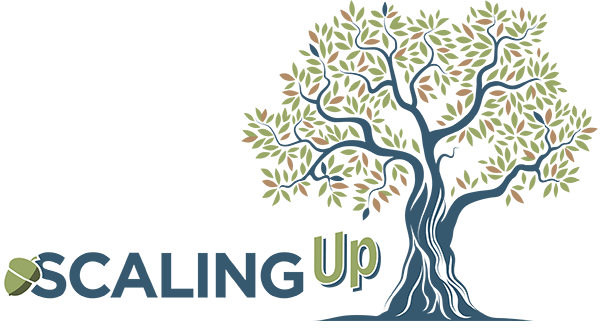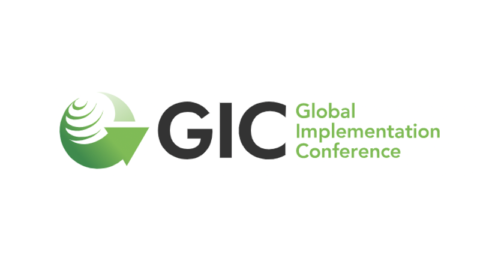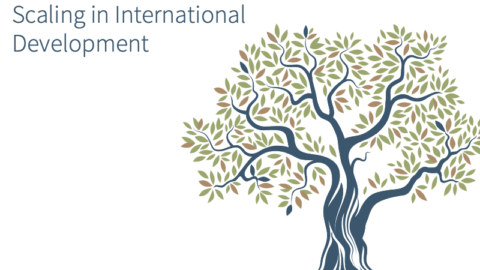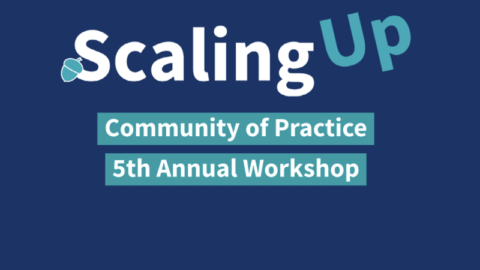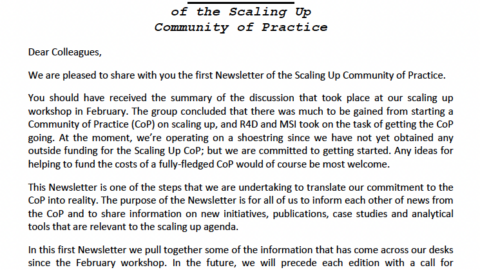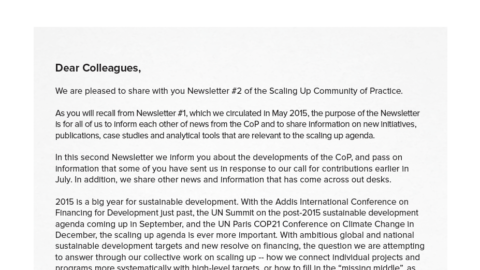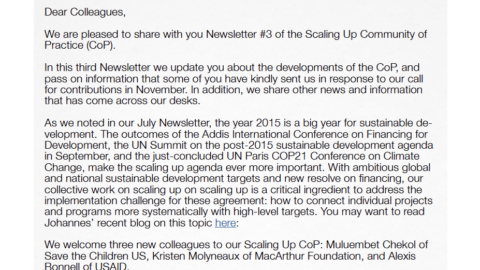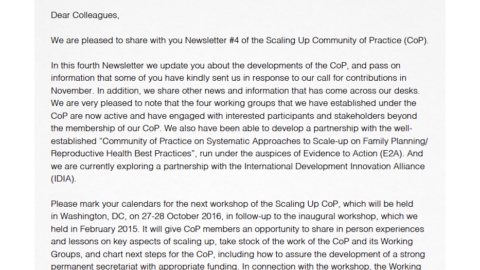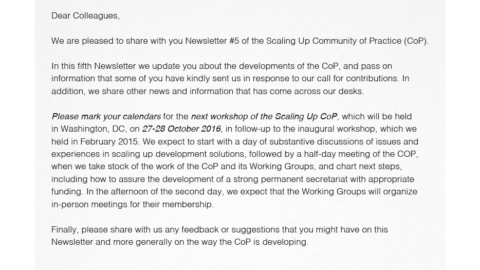Report on the meetings of the Executive Committee (ExCom)
The ExCom meetings were held on 21 March, 6 April, and 11 July 2022 and focused mostly on the institutional transition of the CoP, which is under consideration, and discussed the CoP’s approach to resource mobilization. They also reviewed statements of the CoP’s purpose, history, activities, and plans for the future; and approved a one-page summary statement, a 3-pager, and a more detailed 8 pager, each intended for different audiences in support of our resource mobilization and outreach activities. These statements will be circulated to the membership shortly for information and use in spreading the word to others about the CoP and its activities.
Crosscutting Issues
As was reported in some detail in Newsletter 23, the Executive Committee (ExCom) decided to commission thought products and convene discussions on selected issues that cut across the sectoral and thematic areas covered by our nine Working Groups based on a review of potential issues summarized in Richard Kohl’s working paper and a blog by Larry Cooley, Richard Kohl and Johannes Linn.
Having covered two areas previously (Scaling and Systems Change, and Scaling Principles and Lessons), during the last four months, we made good progress on two additional areas:
- Scaling via institutionalization of interventions through government: The Monitoring and Evaluation Working Group during 2021 organized five virtual events focused on methods for monitoring and evaluating the process of governments scaling innovations emanating from NGOs or other outside sources. The topic was further explored in a plenary session during the 2021 Annual Workshop. Based on these discussions and a review of the relevant literature, Susan Igras, Larry Cooley and John Floretta prepared a paper that has now been posted on the CoP website and is available here.
- Mainstreaming scaling in donor organizations: This topic was discussed at the 2021 Annual Workshop and in Johannes Linn’s blog. Over the last few months, the CoP has been making significant progress in this area: (i) We commissioned an expert review on what is known about scaling in the donor community with a review of the literature and interviews of selected experts, including members of the ExCom to be completed in August 2022. (ii) We organized a webinar with IDRC on the scalingXchange community’s call for action by donors to support scaling more effectively. (iii) We have been in discussions with the German Agency for International Cooperation (GIZ) and with Agence Française de Développement (AFD) on cooperation with the CoP regarding their institutional reviews of to incorporate a focus on scaling within their respective organizations and to contribute to the CoP’s work on mainstreaming. And (iv) we plan to cooperate with the OECD-DAC’s Innovation for Development Facility on supporting their effort to explore mainstreaming scaling among DAC bilateral donors, including the possible development of a set of scaling principles for donors, based in part on the CoP’s Principles and Lessons.
Resources permitting, we will be pursuing these and other crosscutting issues during the remainder of 2022 and in 2023.
Update on the CoP website
scalingcommunityofpractice.com
With the assistance of Food for the Hungry, one of our newest sustaining members, we are reviewing the CoP website and use of social media with the intention to upgrade and overhaul both of these as needed. In the meantime, members are invited to submit their knowledge products (blogs, working papers, etc.) for posting or reposting. The ExCom will provide editorial review and guidance for any knowledge products submitted for publication on the general resource page of the website. WG chairs will serve in the editorial capacity for knowledge products and news items to be posted on the WG pages. Note: All knowledge products to be posted should meet the following criteria: (i) focus on scaling issues, approaches or tools; (ii) report on lessons and implications of scaling experience; (iii) blogs should have 800-1000 words.
Registration on the CoP website
All members are strongly encouraged to register on the website if you have not already done so and to visit the website from time to time to stay apprised of upcoming activities. We will increasingly rely on the website to disseminate materials and to keep everyone informed.
The next CoP Annual Workshop
As noted in the cover letter, the next Annual Workshop of the CoP in under preparation and will most likely take the form of a virtual workshop similar to the ones we organized during the last two years. The current tentative plan is for this Workshop to take place in late January 2023. Depending on the trajectory of the COVID pandemic, this virtual series of webinars would be complemented with an in-person gathering in the Washington, DC area in early summer 2023.
Financial support for the CoP
The CoP depends on the financial support of its members for its effective functioning. The generous support of the following organizations during the years 2019-23 is gratefully acknowledged: CRS, GIZ,
Eleanor Crook Foundation, MacArthur Foundation, Lever for Change, MasterCard Foundation, Oak Foundation, Bill and Melinda Gates Foundation, Management Systems International, Food for the Hungry, and ExpandNet.
As noted in the cover letter, during the coming months, the Resource Mobilization and Finance Committee established by the ExCom will continue to mobilize financial support for the next two years. Please contact (LCooley@msi-inc.com) or Johannes (jlinn@brookings.edu) with any funding ideas you might have.
Working Groups of the Scaling Up Community of Practice
The CoP hosts nine working groups (WGs). Their recent and currently planned activities are listed below, together with the names and e-mail addresses of the chairpersons. For more information on each working group and on how to join and contribute to a working group, please visit the CoP Website (www.scalingcommunityofpractice.com) or contact the respective chairperson(s). You can also reach out to Larry (LCooley@msi-inc.com) or Johannes (jlinn@brookings.edu).
| Working Group topic | Working Group coordinators |
|---|---|
| Education | Heather Simpson (Room to Read) Heather.Simpson@roomtoread.org Gaelle Simon (MSI) gsimon@msi-inc.com |
| Fragile States | Jonathan Papoulidis (WorldVision) jpapouli@worldvision.org Robert S Chase (World Bank) rchase@worldbank.org |
| Agriculture and Rural Development (ARD) | Maria Boa (CIMMYT) M.Boa@cgiar.org Julie Howard (CSIS) jhowardfoodsec@gmail.com Frank Place (IFPRI) F.Place@cgiar.org Lennart Woltering (CIMMYT) L.Woltering@cgiar.org Mark Huisinga (USAID) mhuisinga@usaid.gov |
| Monitoring and Evaluation (M&E) | Larry Cooley (MSI) LCooley@msi-inc.org John Floretta (J-PAL) jfloretta@povertyactionlab.org |
| Health | Laura J. Ghiron (ExpandNet and Evidence to Action Project) ljghiron@umich.edu |
| Social Enterprise | Isabel Guerrero (IMAGO) iguerrero@imagogg.org Elain Tinsley (World Bank) etinsley@worldbank.org Colin Christensen (One Acre Fund) colin.christensen@oneacrefund.org |
| Youth Employment | Elizabeth Vance (International Youth Foundation, IYF) e.vance@iyfnet.org Hisham Jabi (Consultant, World Bank) hishamjabi@gmail.com Jessica Ngo (MSI) jngo@msi-inc.com |
| Nutrition | Dylan Walters (Nutrition International) dwalters@NUTRITIONINTL.ORG |
| Climate Change | George Zedginidze (Green Climate Fund) gzedginidze@gcfund.org |
Agriculture and rural development (ARD) Working Group
The Agriculture and Rural Development Working Group is planning a series of webinars and meetings on the topic of coordination in scaling of innovations. Typically, individual projects design and implement scaling plans to meet their own needs; yet those with interests in agriculture, environment or food systems often engage with the same national partners and seek to develop related capacities and enabling environments. As the CGIAR has rolled out its new investment prospectus, there is a unique opportunity to better coordinate its own scaling efforts and to link more closely with those of other development partners. We hope to engage with governments in a few countries to see how, through their leadership, scaling of desirable innovations can be made more effective and efficient. Discussions are currently underway with the Kenyan government.
Climate Change Working Group
The Climate Change Working Group is planning an event in September 2022 on the use of climate information for adaptation and ways of including it in programming activities.
Education Working Group
The Working Group will explore the following topics in webinars during 2022, building on the interests expressed by working group members, including from the survey administered during the working group’s session at the annual meeting last November. We welcome any additional feedback or suggestions related to these or other proposed themes.
- Role of intermediary organizations (September 2022)
- Teacher training and support (timing to be determined)
Additionally, group members and participants expressed an interest in using various approaches to discuss these issues. Suggestions include: presenting illustrative cases, sharing experiences across sectors, providing concrete guidance and tools, and holding more open, less structured conversations about concepts and frameworks.
Fragile States Working Group
The Scaling Up in Fragile States Working Group will continue to host partner/member presentations and convene dialogue around its core focus areas: a) promoting adaptive, resilient and politicallysmart methods for scaling; (b) elaborating on the obstacles to scaling in fragile states and how they have been overcome, or when scaling should not have been attempted; (c) applying scaling-up approaches to bridge the nexus between humanitarian, peace and development interventions; and (d) examining ways to strengthen country institutions and mobilize private sector finance for durable scaling in a range of fragile contexts. The Group looks for opportunities to stimulate wider discussions across the Community of Practice in an effort to promote scalable solutions in the context of the Sustainable Development Goals and the Leave No One Behind agenda. We are open to serve as a sounding board for member or partner initiatives, at whatever stage, to help inform the scaling process in the hardest places. Follow our events and updates at: https://scalingcommunityofpractice.com/groups/scaling-up-in-fragile-states/
Health Working Group
The Scaling up CoP’s Health Technical Working Group (HTWG) is planning a webinar to launch our explorations of how different technical areas of global health (i.e. HIV, maternal and child health, malaria, etc.) perceive, discuss, and work on scale up. You are invited to participate in the conversation! To ensure that you receive the session announcement, please email laura.ghiron@expandnet.net to sign up for the HTWG listserv or to confirm that we have your address. The HTWG welcomes professionals from ALL technical areas of global public health and from any other sector who are eager to benefit from the lessons being learned about scaling in the health sector. Please help us spread the word by copying and sharing this information with colleagues who have potential interest.
Monitoring and Evaluation (M&E) Working Group
During calendar year 2021, the Monitoring and Evaluation Working Group held numerous webinars focused on how best to measure progress in institutionalizing within government innovations that originate outside of government. The results of those deliberations are summarized in a working paper written by Susan Igras, Larry Cooley and John Floretta, Advancing Change from the Outside In: Lessons Learned About the Effective Use of Evidence and Intermediaries to Achieve Sustainable Outcomes at Scale Through Government Pathways. The Working Group intends to continue its deep dive on this topic during the remainder of 2022 with three additional webinars, to be summarized in a second working paper and discussed at this year’s Annual Workshop of the CoP. This year’s three webinars, beginning with one on August 9t, will focus on (1) the incorporation of “soft system metrics”, and (2) the effective use of institutionalization tracking by implementers and policymakers.
Nutrition Scaling Working Group
The Nutrition Scaling Working Group is developing a program of events for the remainder of 2022.
Social Enterprise Scaling Up Working Group
The Working Group will offer quarterly webinars where speakers will focus from various perspectives on the transformative, systems change potential of social enterprises.
- August/September: How Co-Impact is helping scale systems change in August/September
- October/November: topic TBD (possibly the link between SEs and localization)
In addition, the Working Group plans to establish a Social Enterprise Workshopping Space as a space for social enterprises to brainstorm concrete solutions to real-time challenges they are facing by leveraging the unique perspectives of the other workshop participants. At each session, a few representatives from active social enterprises will present a specific work challenge they are facing, propose solutions they are considering, and get feedback from the group. The sessions will focus especially on policy and regulatory challenges from which generalizable lessons can be distilled regarding what holds back social enterprises from scaling, ideally leading to useful insights on what policy changes might help governments unlock the potential of social enterprises as a force for systems change. The detailed arrangements for this initiative are currently under development.
Youth Employment Working Group
The Working Group is scheduling dates for the following coffee and bagel sessions:
- Review of different automated career support tools with presentations by the implementers and/or a review of the effectiveness of each;
- Scaling Agripreneurship with focus on creating attractive jobs for youth;
- The changing nature of work due to digital disruption and automation, with a special focus on implications for scaling digital jobs;
- Aggregating private sector partners into clusters to address skills gaps and financing youth employment;
- Mainstreaming scaling of Youth Employment solutions within implementing agencies: What are practical ways out of the project box?
Member News (in alphabetical order)
CGIAR/Wageningen University (Agriculture)
Online course on scaling.
https://innovationandscaling.thinkific.com/courses/innovation-and-scaling.
CGIAR and Wageningen University have developed an online course on innovation and scaling. The course is free, takes approximately 3 hours, and those who successfully complete the course receive a certificate. Since its launch in March 2022, more than 1250 participants have signed up. The course covers 6 Modules and discusses questions including: How do we ensure (gender)responsible scaling? How do we measure the Scaling Readiness of innovations? How to develop evidence-based scaling strategies with partners? An animated video explaining the course can be found here: https://www.scalingreadiness.org/courses/. Please contact Dr Marc Schut (m.schut@cgiar.org), CGIAR and Wageningen University Innovation and Scaling Advisor and Scientist for any questions or feedback.
Scaling Readiness: principles, concepts and case study experiences with a novel approach to support scaling of food system innovations. By Marc Schut et al. In Root, Tuber and Banana Food System Innovations, March 2022
https://www.researchgate.net/publication/357569935_Scaling_Readiness_principles_concepts_and_case_study_experiences_with_a_novel_approach_to_support_scaling_of_food_system_innovations
Scaling of innovations is a key requirement for addressing societal challenges in sectors such as agriculture; but research for development (R4D) programs, projects and other interventions struggle to help innovations scale. There is a gap between new complexity-aware scientific theories and perspectives on innovation, and practical tools and approaches that can improve strategic and operational decision-making in R4D interventions that aim to scale innovations. This chapter aims to bridge the gap by presenting the key concepts and measures of Scaling Readiness, an approach that encourages critical reflection on how ready innovations are for scaling in a particular context for achieving a particular goal, and what actions could accelerate or enhance that scaling. Scaling Readiness provides action-oriented decision support for
- characterizing the innovation and innovation system
- diagnosing the current readiness and use of innovations as a proxy for their impact potential at scale
- developing strategies to overcome bottlenecks for scaling
- facilitating and negotiating multi-stakeholder innovation and scaling processes
- navigating and monitoring the implementation process to allow for adaptive management.
This chapter explains how Scaling Readiness supported the development and implementation of scaling strategies under the CGIAR Research Program on Roots, Tubers and Banana (RTB) in two distinct ways. First it describes how Scaling Readiness informed the design and management of the RTB Scaling Fund, a CGIAR RTB instrument for identifying and nurturing scaling-ready RTB innovations. Second, it provides a case study of how Scaling Readiness was applied in one of the Scaling Fund projects in different countries in Latin America and Africa.
Contact: Marc Schut (m.schut@cgiar.org)
Educate! (Education)
How Skills Training Can Boost Entrepreneurship and Job Creation. April 2022
https://voxdev.org/topic/health-education/how-skills-training-can-boost-entrepreneurship-and-jobcreation-evidence-uganda
In this VoxDevTalk, Paul Gertler discusses – based on a paper by Laura Chioda, David ContrerasLoya, Paul Gertler and Dana Carney – the Skills for Effective Entrepreneurship Development (SEED) intervention, a three-week residential entrepreneurship skills training program implemented in Uganda by the World Bank and the NGO Educate! starting in 2012. In a hard skill-intensive variant of the program, 75% of the curriculum focused on business-relevant skills such as accounting and finance and 25% on soft skills such as emotional self-regulation, negotiation, and motivating teams. In the soft skill-intensive variant, these proportions were reversed. Students in both variants also received daily training and feedback in business plan development. Follow-up studies in 2016 showed significant effects from the program, with the 2,400 students from the two program variants going on to set up 500 more new businesses than a control group and creating 985 additional new jobs. They also reported higher earnings, higher profits, and larger business capital investments, with no significant difference between the hardskills and soft-skills groups. An eight-year post-training follow-up is ongoing, and the researchers plan to study intergenerational transmission of skills in a longer-term follow-up.
Contact: Hannah Ormas (hannah.ornas@experienceeducate.org)
ExpandNet (Health)
Chapter on scaling up in implementation science book: A new professional course textbook entitled
Practical Implementation Science: Moving Evidence into Action, edited by the University of Washington School of Public Health’s Bryan Weiner, Cara Lewis, and Kenneth Sherr, was recently published by Springer. ExpandNet Secretariat Members Ruth Simmons, Peter Fajans, and Laura Ghiron contributed a chapter called “Scaling up evidence-based interventions.”
This textbook is a resource on implementation science for graduate-level courses in the health sciences and allied fields. The ExpandNet chapter briefly lays out the three phases of scale up, and is available for purchase via this link.
Recent and upcoming learning opportunities
ExpandNet is now collaborating with Spark Health Africa, a Southern Africa-based nonprofit that works to strengthen health systems through transformative leadership development for professionals in African ministries of health and partner organizations. Spark leads a Learning Network on Scaling Innovations in the Public Sector, geared for governments, funding partners, and social impact organizations to focus on scaling approaches. ExpandNet and Spark are planning an online workshop on September 29, 2022 for the Learning Network community and beyond (register here). The workshop will highlight experience and lessons from applying ExpandNet/WHO tools for different public health and development interventions in SubSaharan countries. To receive announcements and be kept informed of other events, CoP Members are welcome to connect with Spark and to sign up for their newsletter and the Learning Network.
On June 22, 2022, ExpandNet collaborated with the members of the World Health Organization,
Medicus Mundi and other institutions to host a webinar entitled “Successful national government-led large scale and sustained adolescent pregnancy/childbearing prevention programmes: The cases of England, Ethiopia, Chile and Jamaica.” The webinar outlined important scale-up learning about government leadership that can be of benefit to members of the larger CoP. To access the recording, visit this page.
Contact: Laura Ghiron (laura.ghiron@expandnet.net)
EvidenceAction (Safe water)
Evidence action’s dispenser for safe water doubles in size. By Devika Kehr. Scaling Community of Blog. July 2022.
Evidence Action’s Dispenser for Safe Water doubles in size – Scaling Up Community of Practice (scalingcommunityofpractice.com)
For less than $1.50 per person, per year, Evidence Action’s Dispensers for Safe Water program provides over 4 million people in rural Kenya, Uganda, and Malawi with free and reliable access to safe drinking water. We are excited to double the size of this life-saving program to reach over 9 million people by 2023, including over 10% of Uganda’s population, over 15% of Malawi’s, and over 2 million people in Kenya. This remarkable new investment of up to $64.7 million – recommended by GiveWell, an independent charity evaluator, and funded by Open Philanthropy – was catalyzed by new evidence from Nobel Laureate Michael Kremer and colleagues showing water treatment reduces child mortality by about 25%. As part of their analysis, Kremer and colleagues also looked at implementation data from Dispensers for Safe Water; they estimate the program is over 45 times more cost-effective than the WHO’s “highly cost-effective” threshold. However, unsafe water remains the world’s second-leading cause of child mortality and we are committed to scaling next-generation interventions to improve the health of families and save the lives of young children.
Contact: Devika Kher (devika.kher@evidenceaction.org)
Global Evergreening Alliance (Environment and Climate Change)
Fracture points in scaling sustainable development: The case of “evergreening” and carbon restoration. By John Dixon. Scaling Community of Practice Blog. July 2022.
Fracture points in scaling sustainable development – Scaling Up Community of Practice
(scalingcommunityofpractice.com)
The vision of the Global Evergreening Alliance is to restore degraded agricultural, pastoral, and forest lands, globally. Through nature-based approaches – such as evergreening and regenerative agriculture – we can achieve this with the complete engagement of local communities. This approach leads to more productive and resilient landscapes and agricultural systems, providing small-scale farmer, pastoralist, and forest-dependent communities (both women and men) with improved and diversified livelihoods. This blog explains why scaling evergreening and carbon restoration projects are critical for achieving key SDGs and what are some of the challenges and opportunities encountered in scaling efforts.
Contact: John Dixon (john.dixon@evergreening.org)
International Development Research Center (IDRC) (Education)
Three lessons on how to adapt education solutions at scale. By Serhiy Kovalchuk and Erin Gilchrist. June 2022
https://www.gpekix.org/blog/three-lessons-how-adapt-education-solutions-scale
In this blog series, the authors highlight emerging results from the GPE Knowledge and Innovation Exchange that demonstrate how demand-driven evidence can be generated and mobilized to support education systems strengthening in the Global South. This blog has been produced using notes taken during a KIX-hosted workshop at the Comparative and International Education Society Conference in April 2022, and short reflection pieces prepared by eight KIX applied research projects. Explore them all here.
J-PAL (Education)
Providing school quality information to improve housing mobility for low-income families (January
2022) https://www.povertyactionlab.org/case-study/providing-school-quality-information-improvehousing-mobility-low-income-
families?utm_source=newsletter&utm_medium=email&utm_campaign=apr22
Across the United States, access to high quality schools is a critical component of children’s short- and long-term success, yet this access is often limited to families living in higher-income and disproportionately white neighborhoods. Researchers partnered with AffordableHousing.com (formerly GoSection8) and GreatSchools to test the impact of providing information on school quality to families with a Housing Choice Voucher (HCV) searching for housing. They found that providing school quality information during the housing search process increased the number of families who moved to neighborhoods with higher-performing, less segregated schools. Based on these findings, AffordableHousing.com expanded the provision of school quality information to all of its 60,000 daily website users, thus enabling users to make more informed decisions about where to live and increase academic opportunities for their children.
MAMI Global Network (Early Child Development)
MAMI Global Network Strategy 2021-2025.
https://www.ennonline.net/mamiglobalnetworkstrategy
Since 2010, the Management of At Risk Mothers Special Interest Group (MAMI SIG) has developed into a dynamic community of committed individuals and organizations across nutrition and health. To address the urgent need and make the most of opportunities, momentum and demand, the MAMI SIG was scaled up into a MAMI Global Network in late 2020. In the MAMI Global Network Strategy 2021-25, we describe the MAMI Global Network’s five-year aim, mission, and strategy on MAMI to achieve transparency, to help focus activities, and to enable us all to contribute and engage in collective, coherent action in achieving a shared 2030 vision.
Management Systems International (MSI) (General, Fragile States)
Scaling assistance.
Management Systems International (MSI) is assisting a range of organizations to adapt generic scaling materials to the special needs and circumstances associated with interventions focused on good parenting, gender equity, and preventing child abuse. Activities include tailoring MSI’s scalability assessment and other scaling tools to the needs and circumstance of these interventions, conducting independent scalability assessments, and advising implementers on practical strategies for overcoming the particular obstacles to scaling these types of interventions.
Localization in conflict-assisted settings.
Management Systems International (MSI) authored a paper on Localization in Conflict-Assisted Settings. Building on its previous work on localization and on scaling up in Fragile States, the paper explores the specific implications of implementing scaling strategies in settings where conflict complicates the concepts of local voice and local ownership, and where traditional government and commercial channels of scaling are disrupted.
Contact: Larry Cooley (lcooley@msi-inc.com)
People First Community (General)
Collective Leadership as a Path for Sustainable Development: Putting People, Agency and Leadership First
https://secureservercdn.net/104.238.71.33/m9o.b44.myftpupload.com/wp-content/uploads/2022/06/Updated-People-First-working-paper_6.2.22_final.docx.pdf
For decades, the international development community has grappled with how to enable local ownership for development, which is essential to foster sustainable, systemic change. Calls for elevating the leadership of people marginalized by systemic oppression, decolonizing aid, prioritizing community driven approaches, greater localization, and direct grant-making to local organizations, among others, are becoming louder. However, efforts to foster locally-led development over the past decades have lacked an intentional effort to recognize and develop collective leadership as a path to sustainable progress.
The People-First Community is a cross-sectoral and globally diverse group of practitioners, academics, and public and private sector actors with a shared belief in the importance of prioritizing investing in collective leadership development as a path for sustainable development. This Community initially emerged from a convening at The Rockefeller Foundationʼs Bellagio Center in 2019 aimed at building a movement for change inspired by a central question, “How do we ignite a revolution in development that has people and leadership at the center?” In recent months, we have worked collaboratively to clarify our focus and the objectives of this effort and have clarified that the objectives of this Community are twofold. First, the Community intends to be a space for learning, thought partnership, and collaboration among its members. Second, we aim to raise awareness about the importance of growing investment in collective leadership development and to influence the international development ecosystem.
This working paper summarizes our main learnings thus far and is intended to be a starting point for further feedback and engagement.
Pumpkin Plus (Agriculture)
How to help them to help themselves: Pumpkin Plus combats extreme poverty, hunger & climate Change. By A.Z.M Nazmul Islam Chowdhury. Scaling Community of Practice Blog. July 2022
How to help them help themselves – Scaling Up Community of Practice
(scalingcommunityofpractice.com)
The Pumpkin Plus has come up with the vision of transforming traditional agriculture into a women- and youth-led agribusiness system through commercial integration by adopting a climate smart innovation that uses barren transitional sandbars (islands in riverbeds) to support erosionaffected communities for self-resilience, peace and prosperity. The new approach allows land and water access for the erosion-affected poor at comparatively low cost to produce pumpkin, squash and other high value vegetables as safe food, to generate cash for their living, and diversify their livelihoods. It also allows access to finance and deployment of cost-efficient irrigation systems for large scale expansion of sandbar cropping through an innovative model that cuts time and labor cost by half and doubles productivity. Since its establishment in 2004, a total of 194,000 million tons of pumpkins worth £ 50.60 million have been produced by over 24,540 farmers of which 80% were women. The company monitors a representative sample of those households’ incomes and calculates cost benefit ratios ranging from 1:3 to 1:5 within five months. The program has plans for expansion in the years ahead.
Contact: A.Z.M Nazmul Islam Chowdhury (nichowdhury1966@gmail.com)
Rutgers (Education/Health)
Rutgers commissions the development and testing of a scale up costing tool that calculates the required budget to scale up comprehensive sexuality education (CSE).
The purpose of the generally applicable tool is to provide insights in the costs and costs drivers to sustainably expand the coverage of any existing CSE program by inputting relevant financial parameters about the intervention and the implementation context. Access to this financial data will assist implementers, governments and donors to advocate for informed and tailored solutions and better plan for feasible and sustainable CSE program scale up.
We believe this tool will help address a gap in the development community which we discovered through our study Scaling Up Sexuality Education: Lessons learned and considerations for civil society organizations. The ideal applicant has previous experience in researching economic models for education/health services; an understanding of scaling trajectories; and technical knowledge of CSE and SRHR.
For any inquiries or for an expression of interest, please contact Ardan Kockelkoren via a.kockelkoren@rutgers.nl before 21 August 2022.
Save the Children (Health)
On the road to universal coverage of postnatal care: considerations for a targeted postnatal care approach for at-risk mother-baby dyads in low-income and middle-income countries informed by a consultation with global experts. By Angela Muriuki et al. BMJ Open. June 2022.
https://pubmed.ncbi.nlm.nih.gov/35701048/
The potential of timely, quality postnatal care (PNC) to reduce maternal and newborn mortality and to advance progress toward universal health coverage (UHC) is well-documented. Yet, in many low-income and middle-income countries, coverage of PNC remains low. Risk-stratified approaches can maximize limited resources by targeting mother-baby dyads meeting the evidence-based risk criteria which predict poor postnatal outcomes. The objectives of this research were to review evidence-based risk criteria for identification of at-risk mother-baby dyads, drawn from a literature review, and to identify key considerations for their use in a riskstratified PNC approach. A virtual, semi-structured group discussion was conducted with maternal and newborn health experts on Zoom. Participants were identified through purposive sampling based on content and context expertise.
The study surfaced several key themes and highlighted the need for implementation research at the country level to better understand the feasibility and practicality, and the unintended consequences, of addressing clinical and non-clinical risk factors.
Contact: Melanie Yahner (myahner@savechildren.org)
ScalingXchange (General)
A Call to Action from the Global South on Scaling Impact: Connecting to the CoP’s Work on Mainstreaming
Earlier this year, a series of conversations among a group of 18 researchers and innovators from across the Global South led to the publication of a Call to Action from the Global South on Scaling Impact. The Call sets out a set of eight concrete actions that funders and development agencies can take to improve support for scaling impact. In May, the Scaling Community of Practice co-hosted a webinar where authors of the Call shared and discussed their work, and representatives of funders and development agencies spoke to what it means for them.
As co-chairs of the Scaling Community of Practice, Johannes Linn and Larry Cooley co-authored a written response to the Call and its relevance to the CoP’s work on mainstreaming scaling. Read their response here: www.scalingxchange.org/response/informing-mainstreamingdiscussions. If you are interested in contributing a written response to the Call to Action, contact scalingscience@idrc.ca.
Contact: ScalingXchange (scalingscience@idrc.ca)
Teaching at the Right Level (Education)
Scale-up of TaRL Programmes in Nigeria
Teaching at the Right Level (TaRL) programmes are growing. This academic year, TaRL programmes will be active in seven Northern Nigeria states and over 2000 schools. TaRL is a unique intervention for accelerated learning that supports children who would have otherwise been left behind to learn and thrive. Since 2018, TaRL Africa has worked hand-in-hand with government partners and partners such as the British Council, FCDO, and UNICEF to support children to catch up on the basics in the middle to upper primary school. This year, the Nigeria program includes some states launching TaRL programming for the first time, and other states that will be scaling up to more schools within their states. Learn more about TaRL in Nigeria here.
Scale-up of TaRL programmes in Zambia.
From 80 schools in 2016-2017, Catch Up – the contextualized Teaching at the Right Level programme in Zambia – is now reaching over 3350 schools. Catch Up offers learners in grades three, four, and five the opportunity to acquire foundational skills in literacy and numeracy by using the TaRL methodology. The Ministry of Education is successfully implementing Catch Up in eight out of ten Zambian provinces. VVOB, TaRL Africa, and UNICEF provide technical support to the Ministry of Education. Learn more about Catch Up here.
Contact: Ashleigh Morrell (ashleigh.morrell@teachingattherightlevel.org)
Additional Publications and Other Initiatives (by topic area)
General
Carter B., Joshi, A., & Remme, M. (2018). Scaling up inclusive approaches for marginalised and vulnerable people. K4D Emerging Issues Report. Brighton, UK: Institute of Development Studies.
https://prevention-collaborative.org/wp-content/uploads/2021/08/R4D_Scaling-up-inclusiveapproaches-for-marginalised-and-vulnerable-people.pdf
This rapid review summarizes the evidence on how to scale up inclusive approaches to complex social change. It looks at how to design scalable inclusive change interventions, as well as how to plan and manage the scale-up process. Focusing on interventions with the aim of reaching the most marginalized and transforming social norms, it covers programs aiming to deliver inclusive outcomes for women and girls (with a particular focus on preventing violence against women and girls) and persons with disabilities.
Scaling inclusive business impacts at the Base of the Pyramid: A framework inspired by business model ecosystems research. By Milou Derks, Tamara Oukes, Henny Romijn. Journal of Cleaner Production. Vol. 366, 15 September 2022.
https://doi.org/10.1016/j.jclepro.2022.132875
Scaling the social impact of inclusive business models that provide solutions to basic needs of Bottom of the Pyramid (BoP) communities through firm-centric approaches has proven challenging. Researchers have proposed that scaling strategies at the BoP should go beyond firm-centric approaches and involve coordinated, synergistic action of their entire ecosystem to overcome systemic challenges. However, current research on this topic remains abstract and difficult to implement. This paper presents an empirically validated scaling framework designed to overcome this weakness and documents its design process. The framework takes account of the fact that inclusive businesses must work out scaling strategies together with key ecosystem actors, and that implementing a scaling strategy will almost always require mutual adaptation of business models. The framework design process entailed an extensive literature review and practitioner interviews as a first step, followed by testing, evaluation and iterative improvement through a series of validation workshops with actors of four inclusive business initiatives in Africa and Asia. The results have practical and encouraging implications regarding the feasibility of ecosystem-based and collaborative approaches to scaling.
Agriculture and Rural Development
How Innovation and Technology Can Fight Global Hunger. By Bernhard Kowatsch. TED. 29 June 2022.
https://www.youtube.com/watch?v=MgM8MGEikDY
In his recent Ted Talk, Bernhard Kowatsch (Head of the World Food Programme’s Innovation Accelerator) outlined how Sanku’s business approach to ending malnutrition is making a huge difference in the lives of three million East Africans. Watch the full video to hear real-life examples of how technology and innovation are changing the world.
Scaling Banana Bacterial Wilt Management Through Single Diseased Stem Removal in the Great Lakes Region. by Enoch Kikulwe et al. In Root, Tuber and Banana Food System Innovations. January 2022
Xanthomonas wilt (XW) of banana caused by Xanthomonas vasicola pv. musacearum (Xvm) is an emerging and non-curable infectious disease which can cause up to 100% yield loss. This review looks at the process, practices, challenges, lessons learned, and future policy implications associated with scaling of XW management practices.
Deriving scalable measures for restoration of communal grazing lands. By Jason Sircely et al. Ecology and Society, 27(1). January 2022.
The study presents the results of participatory action research in communal grazing lands in East Africa and the use of that research process to inform end users on cost-effective methods for restoring land, improving local livelihoods, reducing environmental degradation, and enhancing ecosystem services. The usefulness of this evidence is demonstrated through quantitative data and stated or revealed preferences of livestock producers. These results are attributable to elements of the action research process, including prioritization of practical producer needs, close involvement of local institutions able to take action, collaborative design of producermanaged trials, and generation of evidence applicable in scaling. Among the restoration options tested, those more successful in trials and preferred by producers tended to have moderate (or low) costs, complexity, time to returns, and risk, suggesting possible optimization of trade-offs among options.
Modern Extension Tools and Approaches for Upscaling, Outscaling and Deep-Scaling Wheat and Barley Technologies. By A. Kumar et al. In: Prem Lal Kashyap, et al. New Horizons in Wheat and Barley Research. Springer, Singapore. 2022.
https://doi.org/10.1007/978-981-16-4449-8_7
Indian agriculture post-Green Revolution has become intensive in terms of technological innovations and interventions. Inter alia, the success witnessed through the mass adoption of Green Revolution technologies is attributed to the extension methods and approaches used during the period. In the era of digital and smart agriculture, conventional extension approaches may not be sufficient to scale the latest crop production and protection technologies and the chapter highlights modern extension tools and approaches for demand-driven technology transfer in wheat and barley.
Scaling up agricultural interventions: Case studies of climate-smart agriculture. By Olaf Westermann et. al. Agricultural Systems, Volume 165, September 2018.
https://www.sciencedirect.com/science/article/abs/pii/S0308521X1830043X?via%3Dihub
If climate-smart agriculture (CSA) is meaningfully to address the development challenges posed by climate change, effective approaches will be needed to scale up research findings. Here, eleven case studies are used to exemplify scaling-up strategies based on: (1) value chains and private sector involvement, (2) information and communication technologies and agro-advisory services, and (3) policy engagement. Case studies and the scaling strategies they exemplify are evaluated using a simple conceptual framework from the field of scaling up nutrition interventions. Results highlights the potential of all three strategies for taking CSA interventions to scale and explores the trade-offs to consider when choosing one strategy over another, particularly the trade-off between reaching large numbers of farmers and addressing farmers’ specific contexts. The case studies also highlight several challenges: estimating the costs and benefits of different scaling activities, integrating knowledge across multiple levels, and addressing equity issues in scaling up.
Climate Change
Direct Air Capture: Assessing Impacts to Enable Responsible Scaling. By Katie Lebling at al. WRI Working Paper, May 2022
https://www.wri.org/research/direct-air-captureimpacts?utm_campaign=wriclimateus&utm_source=wriclimateusdacpaper-2022-05-04&utm_medium=email&utm_content=publication
This paper discusses the expected environmental impacts (local and distributed) of building and operating Direct Air Capture (DAC) plants in the United States. It includes a discussion of considerations related to decision-making and DAC siting, including responsible scaling and equitable distribution of benefits, as well as policy and procedural recommendations.
Enhancing the Replication Potential of Smart Lighting Projects. By Madis Talmar, A. Georges L. Romme and Rianne Valkenburg. Smart Cities 5(2):608–632. May 2022.
https://www.researchgate.net/publication/360342908_Enhancing_the_Replication_Potential_of_Sm art_Lighting_Projects
To address major threats to the sustainability and quality of life in urban settings, many municipalities have started exploring routes toward smarter cities to lower their energy consumption and carbon footprint. These explorations, in the form of living labs and other pilot projects, often suffer from major problems in scaling up the initial try-outs. In this study, we identify the mechanisms that facilitate the diffusion of smart city solutions, which are developed with public funds but typically lack dedicated resources to spur the diffusion of these solutions within the same municipality or in other municipalities. We introduce the construct of embedded replication potential, defined as the capacity of an original project to be either scaled up locally or replicated elsewhere. Subsequently, empirical findings from a study of smart lighting projects in several municipalities in northwestern Europe serve to develop a checklistbased tool for assessing the embedded replication potential of an initial project. This tool can also be used to assess the replication potential of other smart city projects.
Evaluation
Transformational Change for People and the Planet — Evaluating Environment and Development. By Juha I. Uitto and Geeta Batra, Editors, Springer Nature. 2022
https://link.springer.com/content/pdf/10.1007%2F978-3-030-78853-7.pdf
This book provides an interdisciplinary perspective on innovative and emerging knowledge and practice related to environment, natural resources management, climate change, and development. The focus is on the role of evaluation in promoting transformational change toward a more sustainable future.
Health
Scaling Up Public Health Interventions: Engaging Partners Across Multiple Levels. By Jennifer Leeman, Alix Boisson, and Vivian Go. Annual Review of Public Health, Vol. 43:155-171. April 2022.
https://doi.org/10.1146/annurev-publhealth-052020-113438
Advancing the science of intervention scale-up is essential to increasing the impact of effective interventions at regional and national levels. In contrast with work in high-income countries (HICs) where scale-up research has been limited, researchers in low- and middle-income countries (LMICs) have conducted numerous studies on the regional and national scale-up of interventions. In this article, we review the state of the science on intervention scale-up in both HICs and LMICs. We provide an introduction to the elements of scale-up followed by a description of the scale-up process, with an illustrative case study from our own research. We then present findings from a scoping review comparing scale-up studies in LMIC and HIC settings. We conclude with lessons learned and recommendations for improving scale-up research.
